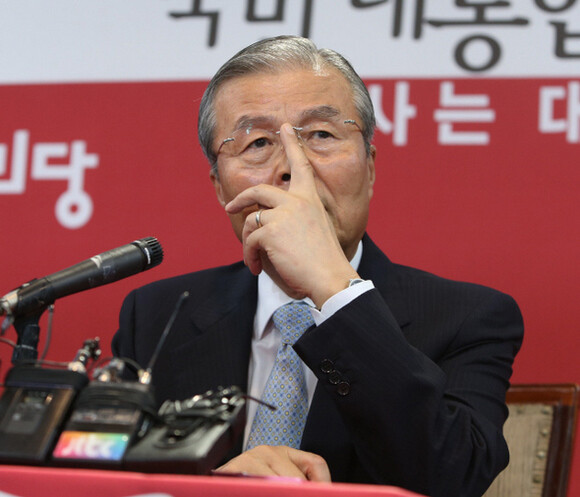hankyoreh
Links to other country sites 다른 나라 사이트 링크
Ruling party may not be sincere about economic democracy

By Seong Yeon-cheol, staff reporter
The chairman of the New Frontier Party's committee for "public happiness" has been openly critical of his party's, and presidential candidate Park Geun-hye's, apparent unwillingness to take action toward economic democracy. The source of Kim Jong-in's displeasure appears to have been Park's noncommittal stance on the issue.
Kim, 72, delivered his remarks at a Sept. 14 Economic Democracy Symposium at the Korea Exchange in Seoul's Yeouido district. The event was jointly organized by the Korean Finance Association and Korea Capital Market Institute.
During his speech, Kim said he came to the NFP at the request of the party and Park, who he said "thought they couldn't get the hearts of the public without working toward economic democracy."
Kim also said a close acquaintance, Hansung University professor Kim Sang-jo, told him he would be "used and discarded" by Park.
"It's still not clear at all that any of them [Park and the NFP] have any determination to pursue economic democracy," he said.
Kim also made reference to his resignation as emergency committee member in March following the party's nominations for the general election. “It looked to me like not a single person who got nominated for the party would take action for economic democracy, so I said, 'I can't do this,'” he explained.
Kim pointed to the 1979 assassination of Park's father, former President Park Chung-hee, in stressing the need for economic democracy. “People ask what Yushin has to do with anything,” he said. “But if you really look at why Park Chung-hee met the tragic fate he did after being successful economically, you'll agree that today's political community needs to push strong measures for economic democracy.”
Speaking about the 1960s and 1970s, the period of Park Chung-hee's rule (1961-1979), Kim said, "When the public is struggling to survive, their consciousness changes, and they develop new desires…. but the administration back then failed to adapt to these changes and mistakenly concluded it could solve everything through the use of public authority."
Kim said the assassination was "what happens when economic success is coupled with Park Chung-hee's own failings."
Kim also took aim at the Samsung Group. Commenting that the group accounts for around one-quarter of all areas of the South Korean economy, he said, "We can't simply put the country's fate in the hands of a company that could fail or succeed depending on what happens with the economy."
"If the new government responsible for the next five years doesn't fully understand this, it won't last one year before it's too rattled to do anything," he said.
He also said he was not at all convinced the national economy could continue developing sustainably amid a growing gap between rich and poor.
"If we don't make the limits absolutely clear, we could end up facing an out-of-control situation," he said.
Please direct questions or comments to [englishhani@hani.co.kr]

Editorial・opinion
![[Column] The tragedy of Korea’s perpetually self-sabotaging diplomacy with Japan [Column] The tragedy of Korea’s perpetually self-sabotaging diplomacy with Japan](https://flexible.img.hani.co.kr/flexible/normal/500/300/imgdb/original/2024/0617/4017186120752965.jpg) [Column] The tragedy of Korea’s perpetually self-sabotaging diplomacy with Japan
[Column] The tragedy of Korea’s perpetually self-sabotaging diplomacy with Japan![[Column] Moon Jae-in’s defense doublethink [Column] Moon Jae-in’s defense doublethink](https://flexible.img.hani.co.kr/flexible/normal/500/300/imgdb/original/2024/0617/9017186119477876.jpg) [Column] Moon Jae-in’s defense doublethink
[Column] Moon Jae-in’s defense doublethink- [Column] S. Korea-China cooperation still has a long way to go
- [Editorial] Seoul must use tact and diplomacy to check deepening Russia-NK ties
- [Editorial] Thorough audit, evaluation of oil test drilling are needed
- [Editorial] Yoon prioritizes his administration over South Korea’s safety once again
- [Column] The monumental shift in N. Korea’s nuclear program that never happened
- [Editorial] Yoon must submit himself to questioning over Marine investigation interference
- [Editorial] Court’s reversal of prosecutor’s impeachment will only embolden his peers
- [Column] How Korea’s restaurant servers went from being called ‘aunties’ to ‘bosses’
Most viewed articles
- 1As Putin heads to Pyongyang, differing interests may make for difficult deals
- 2US extended deterrence on Korea violates international law, argue experts
- 3[Column] Moon Jae-in’s defense doublethink
- 4Could Putin’s visit to North Korea resurrect a Cold War-era military alliance?
- 5[Column] The tragedy of Korea’s perpetually self-sabotaging diplomacy with Japan
- 6Will China use diplomatic, security dialogue with Seoul to check Russia’s cooperation with N. Korea?
- 7[Reporter’s notebook] Better late than never to summon Korea's first lady for questioning
- 8What’s up with N. Korea installing a wall along the border with the South?
- 9Korea to offer K-culture training visas, unlimited ride transit passes for tourists
- 10Seoul warns Moscow not to ‘cross any lines’ with Pyongyang ahead of Putin visit